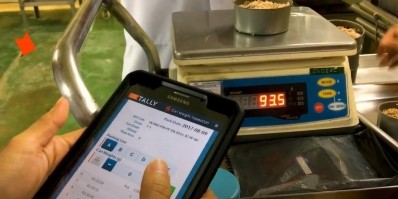Food trade in a post-COVID-19 world: More digitalisation and fewer trade barriers demanded by experts

The expert panel convened at the recent APEC CEO Summit 2021 to discuss trade recovery in the region, including food trade and supply chain recovery, and comprised of New Zealand dairy giant Fonterra’s COO Fraser Whineray, China e-commerce heavyweight DHgate’s Chair and CEO Diane Wang, and Jacobs Engineering Group’s President and COO Bob Pragada.
APEC is a regional economic forum made up of 21 countries surrounding the Pacific Ocean, both from with the Asia Pacific region and otherwise (United States, Peru, etc.)
According to the panel, given the enormous shift that has been seen towards online shopping during the pandemic, it is essential that all food firms are able to be included in this shift to ensure a healthy commercial environment - not just the bigger firms with the budget to do so.
“The COVID-19 pandemic impacted all sectors seriously, with an especially massive impact on international trading of all items [including] food and beverage products,” said Wang.
“Overall, we saw a steep downturn in global trade, which dropped by some 9% in 2020, as well as the collapse of traditional supply chains all over the world which further deteriorated trade.”
The food and beverage sector was one of the most heavily affected by the collapse of global supply chains, as many countries were either unable to harvest crops, or unable to ship/fly their perishable products from seafood to fruits to the usual importing destinations, leading to great deals of food waste and losses.
Although today more supply chains and shipping routes have resumed as compared to the peak of the pandemic, the fact remains that many changes to trade as a whole have taken place and are likely to be integrated into the future of the industry, such as digitalisation.
“[Today], smart technology like ABC (AI, Big data and Cloud) has helped e-commerce and many global supply chains to evolve since the pandemic hit by allowing consumers access to large variety of products conveniently and safely and enabled offline merchants with online channels to maintain operations despite COVID-19 restrictions – but [unfortunately], not all firms have the access or knowledge needed to do this,” Wang added.
“The MSME sector in particular has been heavily affected - we have found that access to these tools is a big obstacle for many MSMEs and individuals, [and] many of them fear the change to digitalisation due to a lack of knowledge and confidence, [which is troubling because] those businesses without digitalisation have been the ones hit the hardest.”
Wang called for private-public partnerships to be set up to address the issue of helping these firms gain digital skills, including the building of an MSME global value chain network and an e-learning alliance in APEC to provide the required training for free.
“This will all require strong partnerships and collaborations between governments and businesses [but the rewards are worth it] to rebuild economies,” said Wang.
“Sellers can sell products directly via online communities with no need to understand trade policies, operations, logistics etc, apart from their own area of specialty and how to manage a network. All kinds of tools are available now to enable equal access to international trade and boost global trade to the next level, [which is] what is needed in these times.”
Pragada concurred on the importance of technology for all types of international trade, and also stated that this change is likely here to stay.
“Even in our own company, we have some four million square feet of office space that is currently not all being used as we have rescaled our footprint to operate in a hybrid model as we know we need to be business-ready for any type of disaster or unexpected event moving forward,” he said.
“Whichever industry any company is in, [from engineering to accounting to food], this really does seem like it is going to be the next generation and future of what work will look like in the coming years.”
Reducing restrictions
Whineray agreed that digitalisation is important, but added that a lot more time is likely to be needed before food supply chains such as dairy can return to a semblance of normalcy.
“Supply chains are currently a very dynamic environment to be ing, as the shipping highways of the world all have slightly too much traffic on them which, or course, is causing traffic jams, and there are dynamic consequences to that,” he said.
”These supply chain challenges are ongoing, and we don’t expect the traffic jams to unwind any time soon, so all companies need to plan for that.
“In addition, it should be noted that these supply chains saw a lot of very important restrictions which were necessary in many markets to keep people well - but it is also important to [remember to] take things out which are no longer required, not just leave all of the restrictions there.
“It is very important moving forward to move to unwind these restrictions, as soon as vaccination rates and science allows for it.”
Here, governments will have to look closely at ensuring that economies are able to get back on their feet by providing consumers, industry and investors at ease to engage in economic activities.
“People will look very closely at arrangements between the governments of member economies to see if they are getting along well and whether activity will be able to happen between both economies [before engaging in economic activity] as they need that protective ‘cloak’ to come together,” Whineray added.
“[For economies to revive and recover] we need that appetite for investment and training and productivity and digitisation and so on, but everyone will be looking closely at what the government leaders put in place to enable us to do that – that’s the importance of governance and state leadership here.”
Whineray also highlighted that the pandemic has led to a change in consumer and employee dynamics, which has led firms such as Fonterra to need to think beyond conventional products and services.
“It is important to keep confidence going around the region with investment into new products and services as consumer dynamics and employee dynamics are changing worldwide,” he said.
“[But in addition to this], we have also seen that the function and requirements of what needs to be provided in terms of nutrition is changing, e.g. less focus on foodservice functions out of home but more on foodservice functions in-home, [perhaps enabling restaurant quality and experiences to be recreated at home].






















